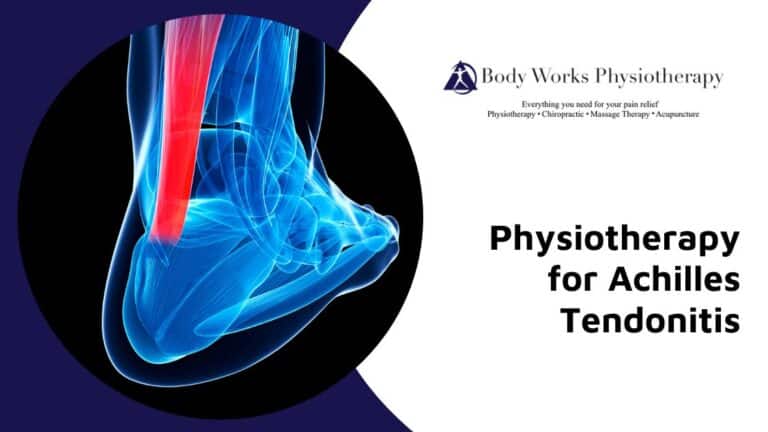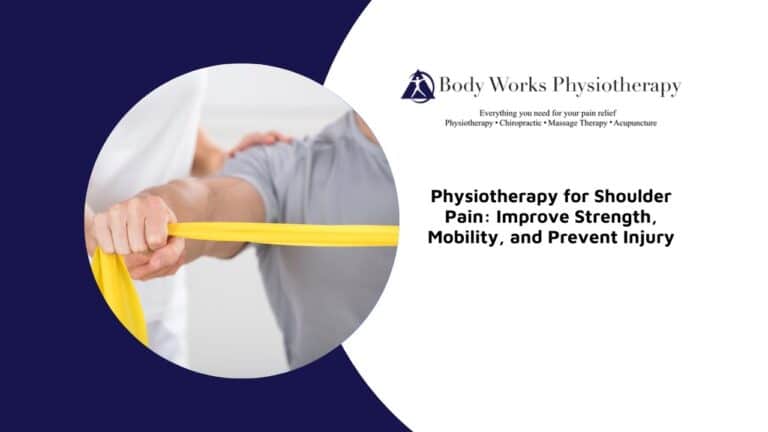
Neck pain is one of the most common musculoskeletal complaints among adults — often worsened by daily habits like poor posture, prolonged screen use, or high-stress lifestyles. Whether the discomfort is sudden or long-standing, physiotherapy provides a safe, effective path to relief and long-term recovery. In this blog, we’ll explore how physiotherapy helps treat neck pain, what to expect from treatment, and how targeted exercises can help prevent it from coming back.
How Physiotherapy Helps Relieve Neck Pain
Neck pain can interfere with even the simplest daily tasks — from turning your head while driving to sitting at a desk for extended periods. Physiotherapy offers a targeted and structured approach to not only relieve pain but also address its root causes.
Physiotherapy targets the root causes of neck pain, such as muscle tension, joint stiffness, or poor posture. Through a combination of hands-on techniques, targeted exercises, and education, physiotherapists reduce pain, restore mobility, and improve overall neck function. This approach not only provides immediate relief but also helps prevent future discomfort.
By identifying underlying issues and building a treatment plan around your specific needs, physiotherapy offers a long-term solution rather than a quick fix.
Can Physiotherapy Exercises Prevent Recurring Neck Pain?
Absolutely. Prevention is a key focus of physiotherapy, especially when it comes to musculoskeletal conditions like neck pain that are often triggered by posture, muscle weakness, or repetitive strain.
Physiotherapy exercises are designed to strengthen neck and upper back muscles, improve posture, and enhance flexibility, all of which help prevent recurring neck pain. Regular practice of these exercises, combined with ergonomic adjustments and stress management, can significantly reduce the likelihood of future issues.
Staying consistent with your home program is one of the most effective ways to maintain neck health long after your pain subsides.
Physiotherapy Techniques Used for Neck Pain
Physiotherapists use a wide range of techniques to help relieve neck pain and improve overall mobility. The treatment plan is customized based on the nature of the injury, its severity, and contributing lifestyle factors.
The most effective techniques include:
- Manual Therapy: Hands-on treatments such as joint mobilization, soft tissue massage, and myofascial release help reduce tension, restore joint mobility, and improve circulation in the neck and upper back.
- Targeted Exercises: Strengthening and stretching routines improve the stability of the neck and upper back while enhancing flexibility and correcting imbalances.
- Postural Training: Many neck issues are posture-related. Physiotherapists guide clients through exercises and awareness techniques to improve alignment during work, rest, and movement.
- Modalities for Pain Relief: Techniques such as heat therapy, ultrasound, or dry needling can be used to decrease inflammation and modulate pain.
This multi-faceted approach allows physiotherapists to adapt treatment as healing progresses, ensuring continuous improvement.
How Long Does It Take to See Results From Physiotherapy for Neck Pain?
Recovery timelines for neck pain can vary depending on the cause, duration, and individual response to treatment. Some people feel relief quickly, while others need a longer rehabilitation period.
Many people notice improvement within a few sessions, especially for acute neck pain. However, chronic conditions or complex cases may require several weeks of consistent treatment. Physiotherapists develop personalized plans to ensure steady progress based on the individual’s needs and recovery goals.
With regular sessions, home exercises, and proper postural habits, most people experience ongoing relief and functional improvement.
Physiotherapy Sessions for Neck Pain: What to Expect
Knowing what to expect during a physiotherapy session can ease any uncertainty and help people feel more confident about starting treatment. The goal is to create a clear, comfortable path to recovery from day one.
During your initial session, the physiotherapist will:
- Review Your Medical History: Understanding your health background, previous injuries, and current symptoms helps shape an accurate assessment.
- Conduct a Physical Examination: This includes assessing posture, range of motion, muscle tension, joint function, and any nerve involvement that may be contributing to pain.
- Identify Contributing Factors: Whether it’s prolonged sitting, stress, repetitive movements, or sleeping position, your physiotherapist will pinpoint what’s fueling the discomfort.
- Create a Tailored Treatment Plan: Based on the assessment, a personalized plan will be designed to target your specific needs and goals.
- Begin Treatment: The session may include gentle manual therapy, guidance on posture, and introductory exercises to begin your recovery journey.
This initial session sets the foundation for long-term recovery through personalized care and ongoing support.
Is Physiotherapy Effective for Chronic Neck Pain Caused by Poor Posture?
Yes, physiotherapy is highly effective for chronic neck pain resulting from poor posture. In today’s tech-heavy world, forward head posture, rounded shoulders, and sedentary work habits are major contributors to chronic discomfort.
Physiotherapists address the underlying biomechanical imbalances, teach corrective techniques, and provide exercises that promote better posture. This can involve retraining how you sit, stand, and move — both during daily tasks and exercise.
Over time, this approach alleviates pain and prevents further strain on the neck, helping people reclaim comfort, flexibility, and function.
Physiotherapy vs. Other Treatments for Neck Pain
When comparing treatment options for neck pain, physiotherapy offers a unique, whole-body approach that goes beyond temporary relief. It focuses on long-term healing through education, movement, and proactive care.
Physiotherapy stands out for its holistic and non-invasive approach. Unlike medications that only mask symptoms or surgeries that carry risks, physiotherapy addresses the root cause of neck pain and promotes natural healing. It also provides long-term solutions by empowering people with tools to manage and prevent pain effectively.
This approach not only reduces pain but also promotes resilience, so people are less likely to experience the same issue again in the future.
Don’t Let Pain Slow You Down
If neck pain is limiting your comfort or mobility, physiotherapy can help you find lasting relief. With personalized treatment plans, hands-on care, and strategies for long-term prevention, physiotherapy empowers you to move more freely and confidently. Contact the team at Body Works Physiotherapy in Scarborough today to start your recovery journey.





